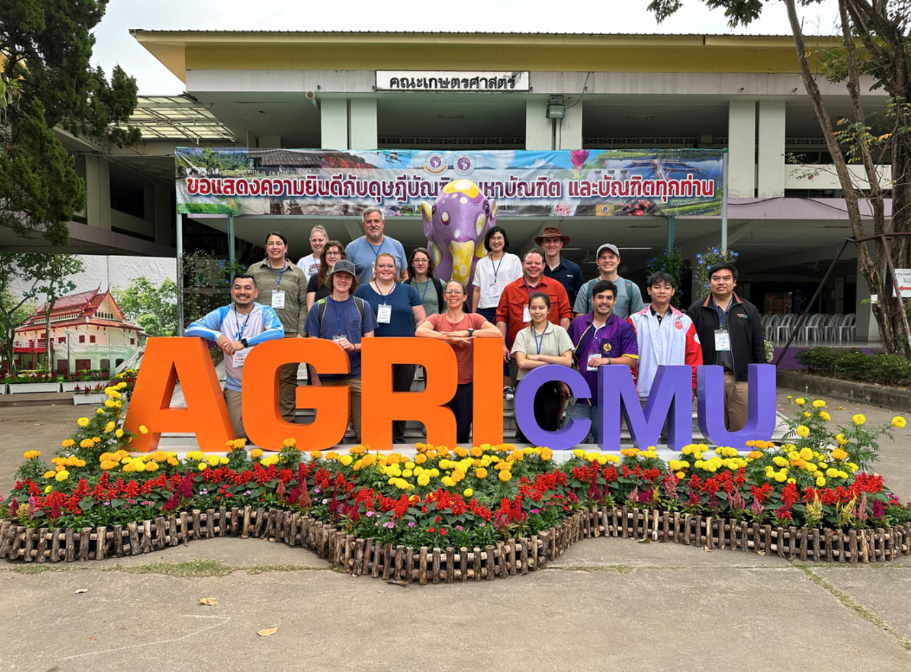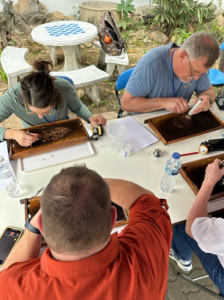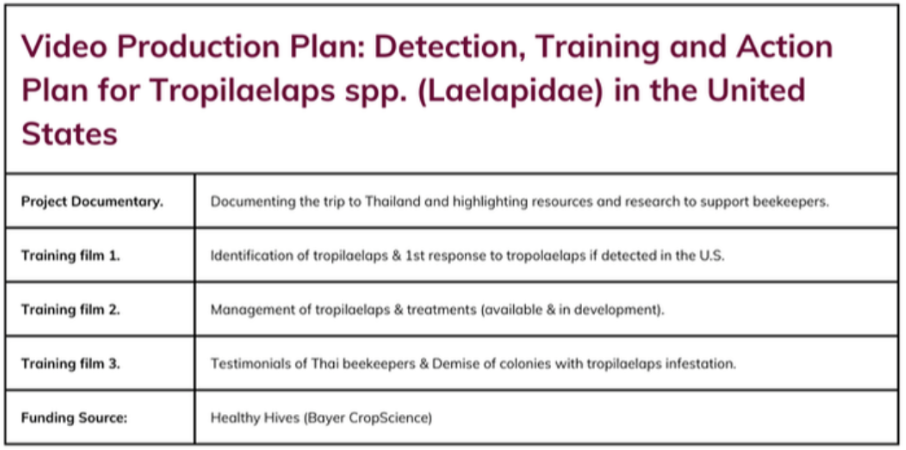Auburn University & Apiary Inspectors Kick Off 2024 Tropilaelaps Training Grant With Successful Thailand Trip.
This work is made possible with National Honey Board and North Dakota Dept of Agriculture funding administered by Project Apis m., and in-kind support from Auburn University, Chiang Mai University, and Apiary Inspectors of America.

Thailand training participants and hosts outside Chiang Mai University’s Faculty of Agriculture posing for a group photo.
Background
In the U.S. the Western honey bees, Apis mellifera, have been devastated by varroa mites, which jumped from the Asian honey bee species Apiscerana many decades ago and arrived in the U.S. in the ‘80’s. Given the history and impact of the Varroa mite to the U.S. beekeeping industry, a growing concern among beekeepers, researchers, and apiary inspectors is the potential threat and impact of new emerging parasitic mites in the genus Tropilaelaps.
Tropilaelaps evolved as a parasite of another Asian honey bee, Apis dorsata. Like Varroa, some Tropilaelaps species – Tropilaelaps mercedesae and Tropilaelaps clareae – also jumped to Apis mellifera several decades ago when Apis mellifera was introduced to Asia. Both Varroa and Tropilaelaps mites parasitizing Apis mellifera, are ectoparasites that feed on brood, causing damage and eventual colony collapse if left unmanaged.
Tropilaelaps mercedesae is the species of primary concern; it is reported to be spreading throughout Asia and surrounding geographies, but has not been detected in North America. Where both mites – Varroa and Tropilaelaps – are present in a hive, management by beekeepers in Asia focuses on the Tropilaelaps mite because they reproduce faster than Varroa and are very damaging to colonies in a shorter amount of time. If the spread and establishment of Tropilaelaps continues along international trade routes, then the introduction, subsequent outbreak, and eventual establishment of these mites may occur from coast to coast within the U.S.
In North America, most state or territories are responsible for managing a major honey bee pest or disease outbreaks. However, some states and territories do not have honey bee regulatory frameworks for mounting a response, and/or lack the necessary support to implement a response. Given the absence of a federally managed, nation-wide apiary inspection program, the Apiary Inspectors of America (AIA) plays a leading role in creating a national framework to address emerging threats to the apicultural industry.
Collectively, AIA members form a non-profit international organization currently representing 35 United States and Canadian provinces and territories that regulate the health and movement of over 3.8 million honey bee colonies (USDA, 2022 Census of A.g). AIA members interact with hundreds of thousands of beekeepers each year. As a result, AIA is the national authority on honey bee health and at the frontlines of managing honey bee pest and pathogen outbreaks, and is key to disseminating relevant information about the factors impacting honey bee health. To support their efforts, Project Apis m. has granted funding from the National Honey Board, in partnership with the North Dakota Department of Agriculture to a collaborative project, led by Dr. Geoffrey Williams from Auburn University.

Training participant (Mike Studer, Apiary Inspector for Tennessee) performing the bump test – which is the standard APHIS disease survey method to detect Tropilaelaps – on colonies parasitized by the mite. Photo by Dr. Geoffrey Williams.

Training participants (Alyssa Piccolomini, State Entomologist for Montana, Mike Studer, Apiary Inspector for Tennessee, and Kim Skrym, Apiary Inspector for Massachusetts) uncapping brood cells to observe developing tropilaelaps mites. Photo by. Dr. Geoffrey Williams.
 Ahead of the arrival of this parasite, this grant aims to take on the imperative task of developing a well-informed proactive response to the emerging threat of Tropilaelaps, with key federal colleagues to provide apiary inspectors with the most up-to-date information about Tropilaelaps, training on how to identify adult mites and appropriately monitor live honey bee colonies in the field, and to create a support network that will allow members to share this scientifically backed knowledge and tools with other inspectors, beekeepers, and the public. The first of these trainings was recently hosted by Dr. Bajaree Chuttong at Chiang Mai University in Thailand, where Tropilaelaps can be observed. A second follow up event will be hosted by Dr. Williams at Auburn University in the USA.
Ahead of the arrival of this parasite, this grant aims to take on the imperative task of developing a well-informed proactive response to the emerging threat of Tropilaelaps, with key federal colleagues to provide apiary inspectors with the most up-to-date information about Tropilaelaps, training on how to identify adult mites and appropriately monitor live honey bee colonies in the field, and to create a support network that will allow members to share this scientifically backed knowledge and tools with other inspectors, beekeepers, and the public. The first of these trainings was recently hosted by Dr. Bajaree Chuttong at Chiang Mai University in Thailand, where Tropilaelaps can be observed. A second follow up event will be hosted by Dr. Williams at Auburn University in the USA.
“We are happy to report that the Thailand training was informative and yielded many invaluable assets for the U.S. beekeeping Industry to build training materials from!”
Additionally, Project Apis m., with funding from the Healthy Hives research program, sent Wonderstone Films on the Thailand trip to document the training and create a public-facing documentary as well as three training videos related to identification, management, and impacts of this parasite. These are expected to be ready towards the end of 2024.
 By: Danielle Downey (PAm.), Dr. Geoff Williams (Auburn University), and Grace Kunkel (PAm.)
By: Danielle Downey (PAm.), Dr. Geoff Williams (Auburn University), and Grace Kunkel (PAm.)
Read the original article here: https://www.projectapism.org/pam-blog/thailand-training






